Reviews/Accounts - last 5 years
Review J. Braz. Chem. Soc. 2025
From Protection to Pollution: The Impact of Mask Use on Micro(nano)plastic Release
Gabriel M. Ferraz  ; Jonatas S. Carvalho
; Jonatas S. Carvalho  ; Gustavo B. dos Santos
; Gustavo B. dos Santos  ; Natasha Caroline C. Sousa
; Natasha Caroline C. Sousa  ; Ricardo Custódio
; Ricardo Custódio  ;
;
Aline S. de Moraes; Ingrid T. de Miranda; Iseult Lynch  ; Roberta C. Urban
; Roberta C. Urban
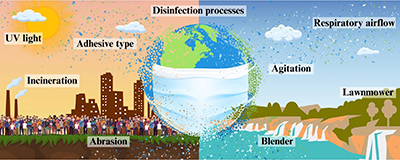
This graphical abstract depicts the environmental and anthropogenic factors contributing to the degradation of face masks into microplastics and nanoplastics, highlighting their potential pathways across urban and natural ecosystems.
https://dx.doi.org/10.21577/0103-5053.20250165
Review J. Braz. Chem. Soc. 2025
Mass Spectrometry-Based Metabolomics for the Development of Bioinputs: A Review on Plant Growth-Promoting Yeasts
Miriã A. Souza  ; Tallyta S. Teixeira
; Tallyta S. Teixeira  ; Jorge C. Rodrigues Neto
; Jorge C. Rodrigues Neto  ; Caio O. G. Silva
; Caio O. G. Silva  ; Catharine A. Bomfim
; Catharine A. Bomfim  ; Eder A. Barbosa
; Eder A. Barbosa  ;
;
Félix G. de Siqueira  ; Patrícia V. Abdelnur
; Patrícia V. Abdelnur
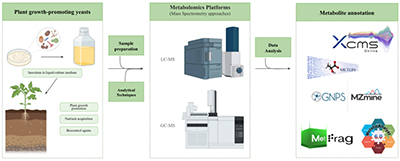
Mass spectrometry-based metabolomics for the development of bioinputs: a review on plant growth-promoting yeasts.
https://dx.doi.org/10.21577/0103-5053.20250163
Review J. Braz. Chem. Soc. 2025
From Bench to Bedside in the Global South: OncoTherad (MRB-CFI-1) Experience as Scalable and
Cost-Effective Model for Nanoimmunotherapy Development
Gabriela de Oliveira  ; Adrialdo José Santos
; Adrialdo José Santos  ; Gabriela C. A. Camargo
; Gabriela C. A. Camargo  ; Juliana M. Gonçalves
; Juliana M. Gonçalves  ; João Carlos C. Alonso
; João Carlos C. Alonso  ;
;
Nelson Durán  ; Wagner José Fávaro
; Wagner José Fávaro
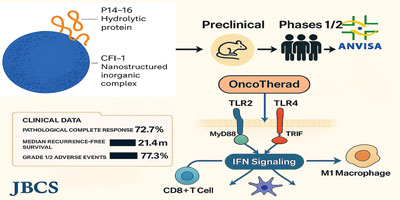
OncoTherad (MRB-CFI-1), a novel nanoimmunotherapy developed in Brazil, activates innate immune system toll like receptors pathways to enhance antitumor immunity. This cost-effective innovation exemplifies scalable immunotherapy from the Global South.
https://dx.doi.org/10.21577/0103-5053.20250134
Review J. Braz. Chem. Soc. 2025, 36(11), 1-24
Koninginins and Related Octaketides from Trichoderma and Other Fungi: Chemical Diversity and Biological Activities
José C. I. Silva  ; Felipe M. A. Silva
; Felipe M. A. Silva  ; Gilvan F. Silva
; Gilvan F. Silva  ; Hector H. F. Koolen
; Hector H. F. Koolen
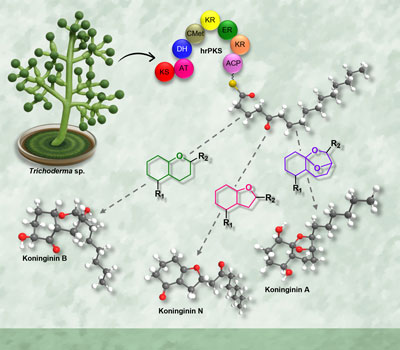
A comprehensive review of the chemistry and biological activities of koningins and related fungal octaketides.
https://dx.doi.org/10.21577/0103-5053.20250110
Review J. Braz. Chem. Soc. 2025, 36(10), 1-17
New Advancements in Production, Purification, and Current Biological Activities of Violacein
Nelson Durán  ; Wagner J. Fávaro
; Wagner J. Fávaro  ; Symone C. de Castro
; Symone C. de Castro  ; Gerson Nakazato
; Gerson Nakazato  ; Guillermo R. Castro
; Guillermo R. Castro  ; Giselle Z. Justo
; Giselle Z. Justo  ;
;
Ljubica Tasic
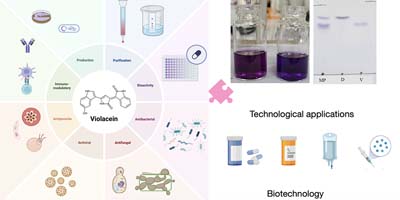
Violacein is a natural purple pigment that shows a wide range of bioactivity. The current review addresses different aspects of violacein, such as its production, purification, and biological activities, aiming to enhance its viability for technological applications.
https://dx.doi.org/10.21577/0103-5053.20250096
Review J. Braz. Chem. Soc. 2025, 36(9), 1-24
Reactive Nitrogen Compounds and BTEX in Urban Atmosphere: Interactions, Ozone Formation Potential, Typical Levels and Trends
Franciele O. C. da Rocha  ; Vânia P. Campos
; Vânia P. Campos  ; Gisele O. da Rocha
; Gisele O. da Rocha

Inorganic nitrogen compounds and BTEX (benzene, toluene, ethylbenzene and xylenes): chemistry of the urban atmosphere and its relationship with air quality and human health.
https://dx.doi.org/10.21577/0103-5053.20250087
Review J. Braz. Chem. Soc. 2025, 36(9), 1-22
Inorganic-Organic-Based Hybrid Sensors for Water Purification: A Review on the Optical Detection and Adsorption of Cadmium and Chromium Ions
Mutairah S. Alshammari  ; Wassila Derafa
; Wassila Derafa  ;Hassanien Gomaa
;Hassanien Gomaa

This review focuses on the development of advanced fluorescent and colorimetric sensors for the detection and removal of cadmium (CdII) and chromium (CrIII,VI) ions from water.
https://dx.doi.org/10.21577/0103-5053.20250086
Review J. Braz. Chem. Soc. 2025, 36(9), 1-33
Exploring the Synthesis and Bioactive Properties of Coumarin-1,2,3-Triazole Conjugates
Amanda de A. Borges; Yuri P. V. de Carvalho; Cristal V. T. Martins; Analice G. R. da Cruz; Edson Evangelista  ;
;
Fernando de C. da Silva  ; Luana da S. M. Forezi
; Luana da S. M. Forezi
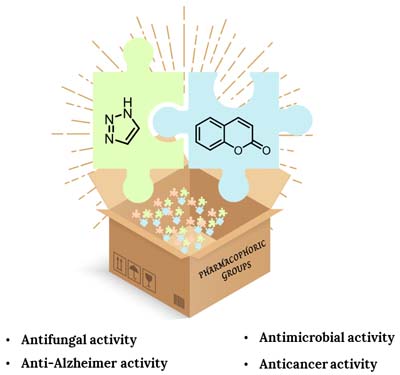
This figure highlights recent advances in the synthesis of bioactive coumarin-1,2,3-triazole hybrids, which show potential in treating infectious diseases, cancer, and Alzheimer's, emphasizing their role in medicinal chemistry.
https://dx.doi.org/10.21577/0103-5053.20250085
Review J. Braz. Chem. Soc. 2025, 36(8), 1-17
Determination of Thermal Process Kinetics by Artificial Neural Networks: A Review Considering Isothermal and Non-Isothermal TG and DSC Data
Rita C. O. Sebastião  ; Natália R. S. Araujo
; Natália R. S. Araujo  ; Felipe S. Carvalho
; Felipe S. Carvalho  ; Bárbara D. L. Ferreira
; Bárbara D. L. Ferreira  ; João Pedro Braga
; João Pedro Braga
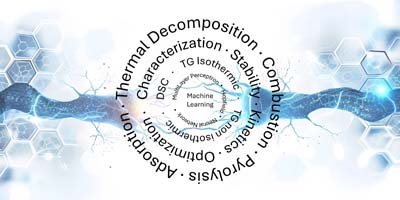
Kinetic of thermal processes can be accurately determined by combining artificial neural network with thermal analysis techniques.
https://dx.doi.org/10.21577/0103-5053.20250084
Review J. Braz. Chem. Soc. 2025, 36(8), 1-20
A Survey of Basic Concepts and Applications of Machine Learning to Chemistry
Julio Cesar Duarte  ; Antonio G. S. de Oliveira-Filho
; Antonio G. S. de Oliveira-Filho  ; Matheus Máximo-Canadas
; Matheus Máximo-Canadas  ; Rubens C. Souza
; Rubens C. Souza  ; Itamar Borges Jr.
; Itamar Borges Jr.
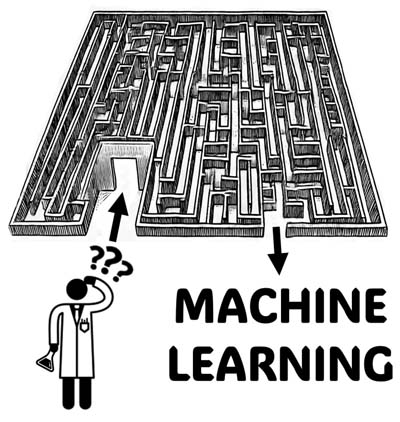
Machine learning uses algorithms and statistical models for defined tasks and learning patterns from data without explicit instructions. Its basic concepts and some applications are reviewed.
https://dx.doi.org/10.21577/0103-5053.20250082
Review J. Braz. Chem. Soc. 2025, 36(9), 1-19
Incorporation of Natural Antioxidants into Biodegradable Food Packaging: Enhancing Food Quality and Shelf Life
Andressa Rafaella S. Bruni  ; Eloize S. Alves; Talita Aparecida F. Campos; Lívia C. Carvalho; Oscar O. Santos Júnior
; Eloize S. Alves; Talita Aparecida F. Campos; Lívia C. Carvalho; Oscar O. Santos Júnior
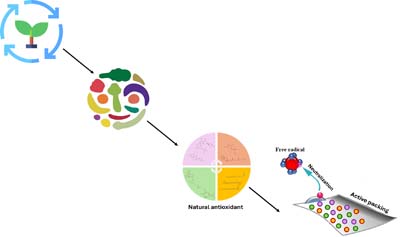
A review of the functionalities of natural antioxidants with sustainable food packaging.
https://dx.doi.org/10.21577/0103-5053.20250074
Review J. Braz. Chem. Soc. 2025, 36(7), 1-31
Mesoporous Carbon-Based Materials Obtained from Biomass and Their Application in the Adsorption of Contaminants: A Review
Paula S. Pinto  ; Rayane C. F. Silva; Rubens L. de Freitas Filho
; Rayane C. F. Silva; Rubens L. de Freitas Filho  ; Luisa O. Santos
; Luisa O. Santos  ; Sarah D. Pereira
; Sarah D. Pereira  ; Ana Paula C. Teixeira
; Ana Paula C. Teixeira
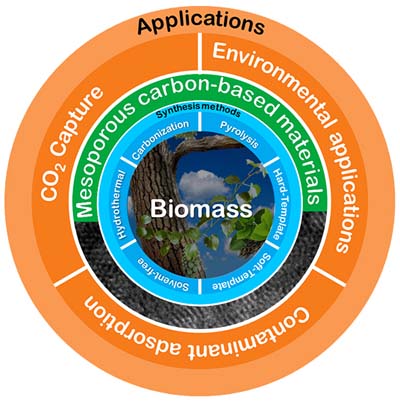
Mesoporous carbon-based materials from biomass can be produced through various synthetic methods and have diverse environmental applications.
https://dx.doi.org/10.21577/0103-5053.20250068
Review J. Braz. Chem. Soc. 2025, 36(8), 1-13
Recent Advances in Natural Language Processing in Chemistry and Materials Science
How to cite this article
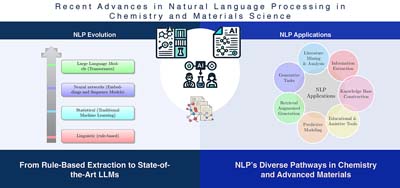
This work paper the applications of Natural Language Processing (NLP) and Large Language Models (LLMs) in chemistry and materials science, highlighting their role in chemical entity recognition, reaction prediction, materials discovery, and literature analysis.
https://dx.doi.org/10.21577/0103-5053.20250067
Review J. Braz. Chem. Soc. 2025, 36(7), 1-14
Advances in Stir Bar Sorptive Extraction: A Systematic Review of Environmental Applications
Ellen Jessica M. P. Campos  ; Carin von Mühlen
; Carin von Mühlen
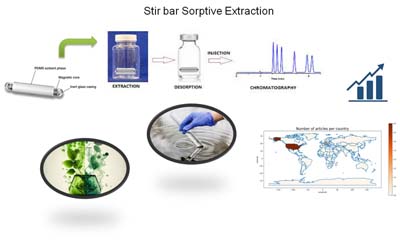
The evolution of environmental analysis using stir bar sorptive extraction (SBSE) highlights its growing applications in detecting environmental contaminants. Recent advancements emphasize its use in analytical chemistry, particularly with gas chromatography, for enhanced sensitivity and precision. Current research reviews the latest applications and discusses present capabilities while forecasting future trends, such as the development of advanced sorptive materials and integration with innovative analytical platforms, paving the way for more sustainable and efficient environmental monitoring solutions.
https://dx.doi.org/10.21577/0103-5053.20250065
Review J. Braz. Chem. Soc. 2025, 36(6), 1-27
White Rot Fungi for Biodegradation of Dyes: Potential for Industrial Uses - A Review
Flávia C. R. Costa  ; Fábio S. L. Brito; Maria Júlia R. de Grandi; Juliana F. S. Daniel
; Fábio S. L. Brito; Maria Júlia R. de Grandi; Juliana F. S. Daniel
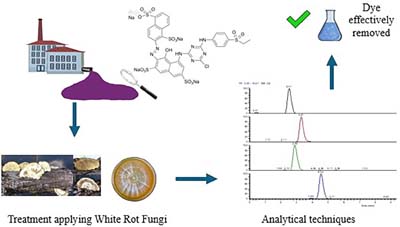
A review of white rot fungi as a promising alternative for the treatment of industrial effluents containing dyes.
https://dx.doi.org/10.21577/0103-5053.20250024
Review J. Braz. Chem. Soc. 2025, 36(5), 1-9
Roles of Oligo(ethylene glycol) to Improve Sensing Systems
Taciana H. Kunst; Paulo Henrique Menezes  ; Ana Paula S. Paim
; Ana Paula S. Paim
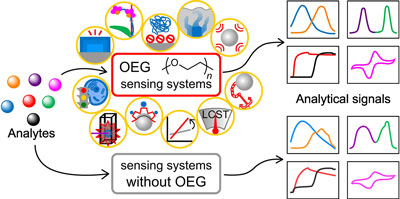
Oligo(ethylene glycol) (OEG) can play several roles in sensing systems. The OEG-containing sensing systems are shown to be advantageous as the OEG improves their performance in the analysis of distinct analytes by different techniques.
https://dx.doi.org/10.21577/0103-5053.20250003
Review J. Braz. Chem. Soc. 2025, 36(4), 1-19
Conventional and Biological Direct Glycerol Fuel Cells: Review on Main Experimental and Model-Based Achievements
Alessandra Pezzini  ; Ruy de Sousa Júnior
; Ruy de Sousa Júnior
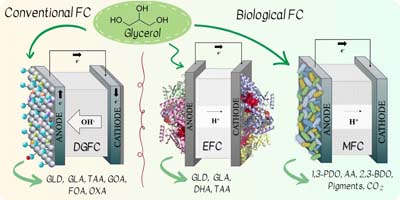
Application of glycerol as a fuel in conventional and biological (enzymatic and microbial) fuel cells, and their main products.
https://dx.doi.org/10.21577/0103-5053.20240223
Review J. Braz. Chem. Soc. 2024, 35(10), 1-21
The Interplay between Protein Frustration and Hotspot Formation
Thamires Q. Froes  ; Marcelo S. Castilho
; Marcelo S. Castilho
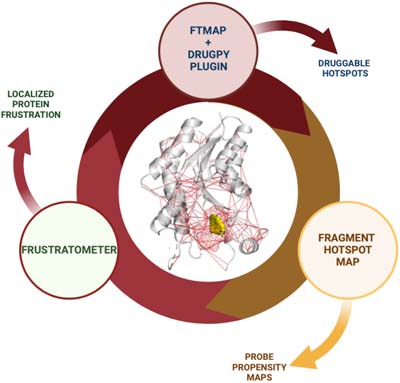
Localized protein frustration is higher around druggable hotspots, partially explaining their origin and suggesting innovative hit-to-lead strategies.
https://dx.doi.org/10.21577/0103-5053.20240168
Review J. Braz. Chem. Soc. 2025, 36(3), 1-9
The Use of Silver Nanoparticles as Antimicrobial Agents between 2014 and 2023 in Brazil and Worldwide: A Bibliometric Review
Lauro S. Laurentino  ; Lísia M. G. dos Santos
; Lísia M. G. dos Santos  ; Cristiane B. Silva; Ana L. R. de Barros; Pamela C. L. Thomas; Josino C. Moreira
; Cristiane B. Silva; Ana L. R. de Barros; Pamela C. L. Thomas; Josino C. Moreira

Keywords map of the most frequently encountered terms in articles regarding the use of silver nanoparticles as antimicrobial agents between 2014 and 2023.
https://dx.doi.org/10.21577/0103-5053.20240167
Review J. Braz. Chem. Soc. 2024, 35(10), 1-31
The Discovery of Protheolysis Targeting Chimeras (PROTACs), Evolution, Design and Perspectives in Modulating Inflammatory Diseases
Lucas Caruso  ; Thiago M. Pereira
; Thiago M. Pereira  ; Arthur E. Kümmerle
; Arthur E. Kümmerle
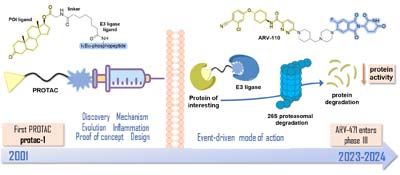
How much PROTACs (protheolysis targeting chimeras) can change the drug discovery? Since its discovery in 2001, a huge evolution has been done in terms of mechanisms, proof of concepts and design. A new PROTAC drug can be one step from the market, with ARV-471 that just entered in phase III clinical trials.
https://dx.doi.org/10.21577/0103-5053.20240160
Review J. Braz. Chem. Soc. 2024, 35(10), 1-18
Drug Repositioning and Artificial Intelligence: Is It a Promising Approach to be Used for Neglected Diseases?
Fernanda Bongiovani; Marcos A. Ferreira-Junior  ; Soraya S. Santos
; Soraya S. Santos  ; Jeanine G. Vargas
; Jeanine G. Vargas  ; Elizabeth I. A. Ferreira
; Elizabeth I. A. Ferreira
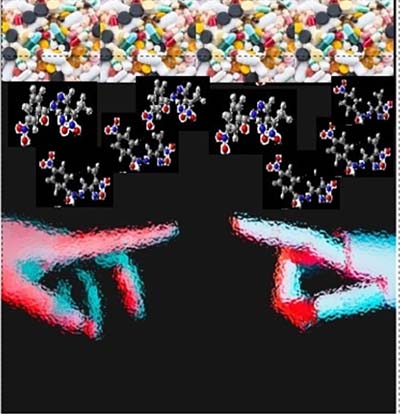
Relationship between drug repositioning, artificial intelligence with essential participation of human beings, generating molecules which could turn into medicines.
https://dx.doi.org/10.21577/0103-5053.20240159
Account J. Braz. Chem. Soc. 2024, 35(12), 1-13
Ionic Silsesquioxanes: A Versatile Tool to Architect Multifunctional Nanostructured Materials
Tania Maria H. Costa  ; Eliana W. de Menezes
; Eliana W. de Menezes  ; Leliz T. Arenas
; Leliz T. Arenas  ; Edilson Valmir Benvenutti
; Edilson Valmir Benvenutti
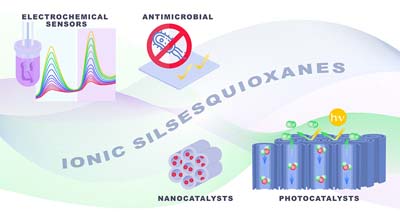
Ionic silsesquioxanes, silica based hybrid polymers with amazing properties, which play important roles in the architecture of multifunctional nanostructured materials to be applied in priority areas such as health, food, and sustainable energy.
https://dx.doi.org/10.21577/0103-5053.20240156
Review J. Braz. Chem. Soc. 2024, 35(10), 1-16
Analogues and Derivatives of Cannabidiol: Pharmacological Insights and Recent Efforts in the Search for Novel Drug Candidates for Inflammation and Pain - a Brief Review Over the Past 3 Decades
Mikaela L. de Souza; Graziella R. R. Franco; Larissa E. Massuda; Vanessa S. Gontijo; Claudio Viegas Jr.
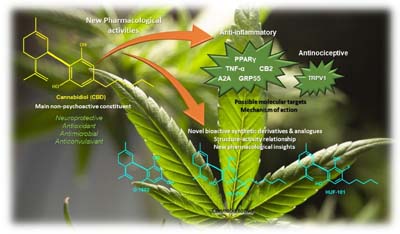
Cannabidiol (CBD) and its synthetic derivatives and analogues have been investigated for decades due to their medicinal uses as neuroprotective, anti-convulsive, antinociceptive, and anti-inflammatory, aimed at clarifying the mechanisms of action underlying their pharmacology and contribute to the development of innovative drugs.
https://dx.doi.org/10.21577/0103-5053.20240155
Review J. Braz. Chem. Soc. 2024, 35(10), 1-25
Analysis of Cannabinoids in Medicinal Cannabis Products: A Comprehensive Review
Julieth G. Herrera  ; Larissa A. Rolim
; Larissa A. Rolim  ; Ricardo S. Honorato
; Ricardo S. Honorato  ; Maria Fernanda Pimentel
; Maria Fernanda Pimentel
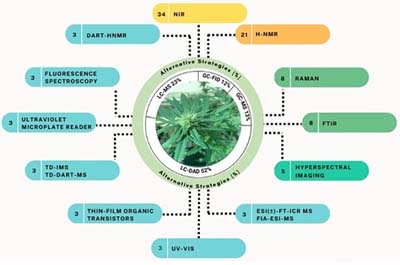
Chromatographic techniques and alternative strategies for qualitative and quantitative analysis of cannabinoids in medicinal cannabis products and cannabis extracts.
https://dx.doi.org/10.21577/0103-5053.20240129
Review J. Braz. Chem. Soc. 2024, 35(10), 1-15
Status and Prospects of Molecular Simulations for Drug Discovery
Hugo Verli  ; Chris Oostenbrink
; Chris Oostenbrink
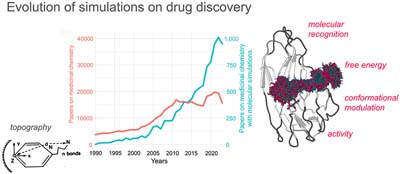
Evolution of molecular simulations applications in drug-discovery in the past 30 years.
https://dx.doi.org/10.21577/0103-5053.20240119
Review J. Braz. Chem. Soc. 2024, 35(10), 1-26
Thirty Years in the Design and Development of Cruzain Inhibitors
Gabriel Jasinski; María Florencia Martini; Albertina G. Moglioni
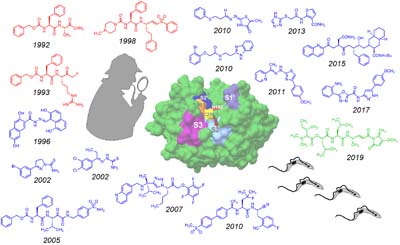
This review presents the main developments in inhibitors of cruzipain/cruzain, a crucial enzyme in the life cycle of Trypanosoma cruzi, the etiological agent of Chagas disease, from the 1990s to the present.
https://dx.doi.org/10.21577/0103-5053.20240115
Review J. Braz. Chem. Soc. 2024, 35(10), 1-29
Structure-Based Virtual Screening: Successes and Pitfalls
Adenilson G. Lima; André B. Penteado; Jullyane G. de Jesus; Vanessa J. R. de Paula; Witor R. Ferraz  ; Gustavo H. G. Trossini
; Gustavo H. G. Trossini
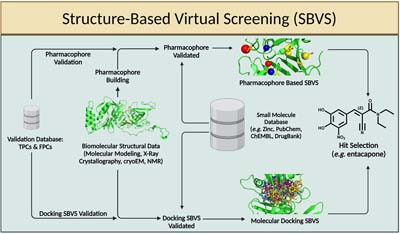
Workflow diagram of a structure-based virtual screening (SBVS) process showing the two approaches discussed in this work.
https://dx.doi.org/10.21577/0103-5053.20240112
Review J. Braz. Chem. Soc. 2024, 35(10), 1-13
30 Years of Kinase Inhibitors: A Historical Overview and some Brazilian Contributions
Júlia G. B. Pedreira  ; Stefan Laufer
; Stefan Laufer
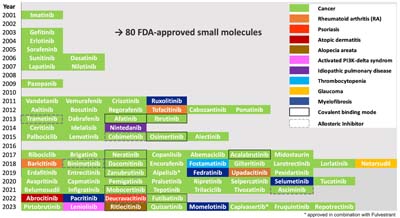
This work reviews protein kinase inhibitors of the last 30 years and highlights contributions from Brazilian researchers.
https://dx.doi.org/10.21577/0103-5053.20240107
Review J. Braz. Chem. Soc. 2024, 35(10), 1-35
Advancements in the Synthesis and Biological Properties of Carboranes and High‑Boron Related Compounds: A Comprehensive Exploration with Emphasis on BNCT Applications
How to cite this article
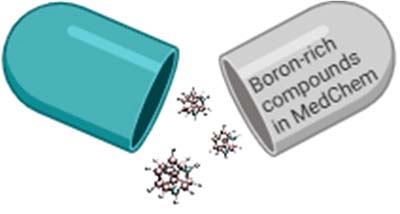
The advancements in both chemistry and the biological behavior, with a focus on boron neutron capture therapy involving specific polyhedral boron clusters, are examined.
https://dx.doi.org/10.21577/0103-5053.20240109
Review J. Braz. Chem. Soc. 2024, 35(10), 1-21
Organometallics in Medicinal Chemistry: Antiparasitic Agents
How to cite this article
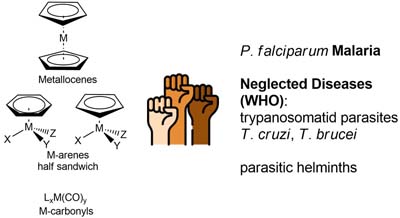
Metallocenes, "half sandwich" M-arenes and metal carbonyls are potential drugs against malaria and neglected diseases caused by trypanosomatid parasites and parasitic helminths.
https://dx.doi.org/10.21577/0103-5053.20240104
Review J. Braz. Chem. Soc. 2024, 35(10), 1-16
From Origin to Current Methods: An Overview of Molecular Modeling Applied to Medicinal Chemistry in the Last 30 Years
Vinícius N. Rocha; Carlos M. R. Sant'Anna
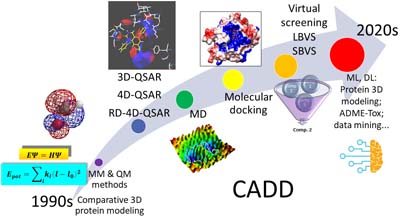
The image shows the evolution in the usage of Computer-Assisted Drug Design (CADD) methods during the last 30 years.
https://dx.doi.org/10.21577/0103-5053.20240103
Review J. Braz. Chem. Soc. 2024, 35(10), 1-21
Intrinsically Disordered Malaria Antigens: An Overview of Structures, Dynamics and Molecular Simulation Opportunities
Pamella C. C. da Silva  ; Leandro Martínez
; Leandro Martínez
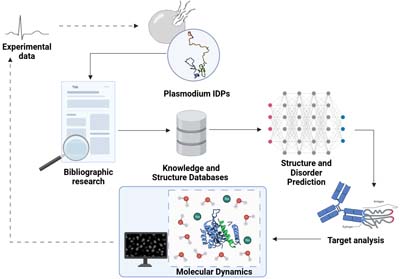
A bibliographical review of molecular dynamics enhanced sampling techniques for analysis of Plasmodium falciparum proteins and their implications for antibody binding.
https://dx.doi.org/10.21577/0103-5053.20240102
Review J. Braz. Chem. Soc. 2024, 35(10), 1-19
Bioactive Amino-Quinazolines: Synthesis and Therapeutic Applications
Lucas S. Franco  ; Pedro S. M. Pinheiro
; Pedro S. M. Pinheiro  ; Maria Letícia C. Barbosa
; Maria Letícia C. Barbosa

This article reviews the synthesis and biological activities of the amino-quinazoline privileged structure over the last 30 years, focusing on the last decade.
https://dx.doi.org/10.21577/0103-5053.20240100
Review J. Braz. Chem. Soc. 2024, 35(10), 1-23
The Thin Line between Promiscuous and Privileged Structures in Medicinal Chemistry
Thayná A. Bibiano; Heber Victor Tolomeu  ; Pedro S. M. Pinheiro
; Pedro S. M. Pinheiro  ; Carlos Alberto M. Fraga
; Carlos Alberto M. Fraga
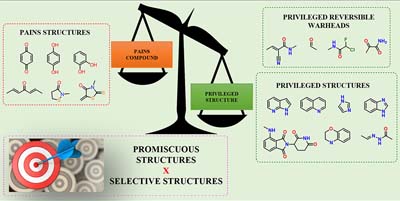
Enhancing the equilibrium between promiscuous and privileged structures in Medicinal Chemistry.
https://dx.doi.org/10.21577/0103-5053.20240091
Review J. Braz. Chem. Soc. 2024, 35(11), 1-24
Lead-Free Halide Double Perovskites Nanomaterials: Fundamentals, Recent Advances and Perspectives
Igor F. L. Ferreira  ; Letícia F. Magalhães
; Letícia F. Magalhães  ; Thaís A. S. Carvalho
; Thaís A. S. Carvalho  ; Marco A. Schiavon
; Marco A. Schiavon
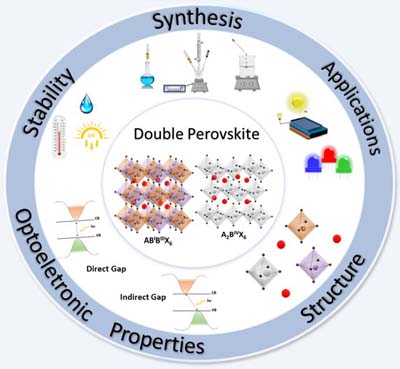
Lead-free halide double perovskites have gained importance due to their promising optoelectronic properties and the possibility of forming multiple combinations, which increases their range of applications.
https://dx.doi.org/10.21577/0103-5053.20240092
Review J. Braz. Chem. Soc. 2024, 35(10), 1-15
Seasoning to Kill: the Example of the Natural Amide Piperine and Its Potential in the Design of New Antiparasitic Drugs
Afonso S. M. M. Velez  ; Paulo Pitasse-Santos
; Paulo Pitasse-Santos  ; Leonardo Freire-de-Lima
; Leonardo Freire-de-Lima  ; Célio G. Freire-de-Lima
; Célio G. Freire-de-Lima  ; Debora Decoté-Ricardo
; Debora Decoté-Ricardo  ; Marco E. F. de Lima
; Marco E. F. de Lima
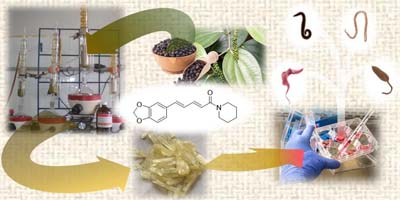
Piperine is a natural amide with an interesting chemical structure and promising activities against several parasitic diseases. It is a renewable natural product easily extracted from black pepper, one of the most important spices used worldwide.
https://dx.doi.org/10.21577/0103-5053.20240085
Review J. Braz. Chem. Soc. 2024, 35(11), 1-18
Property Tuning through Fine Size Control and Hierarchical Nanostructuring of Metal Oxide Nanoparticles Supported in Porous Matrices: a Review
Cristine S. de Oliveira  ; Fernando A. Sigoli
; Fernando A. Sigoli  ; Italo O. Mazali
; Italo O. Mazali
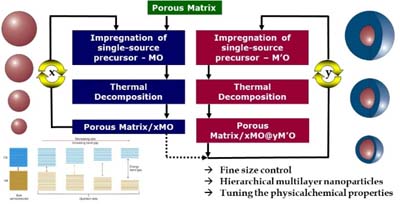
Synthesis of pure, doped and core@shell oxide nanoparticles through a metalorganic layer-by-layer deposition method applied to porous host matrices, where the fine size control allows property tuning.
https://dx.doi.org/10.21577/0103-5053.20240081
Review J. Braz. Chem. Soc. 2024, 35(11), 1-12
Self-Electrified Water is a Powerful Toolbox for the Production of Chemicals and Energy
Fernando Galembeck  ; Leandra P. Santos
; Leandra P. Santos  ; Thiago A. L. Burgo
; Thiago A. L. Burgo  ; Andre Galembeck
; Andre Galembeck
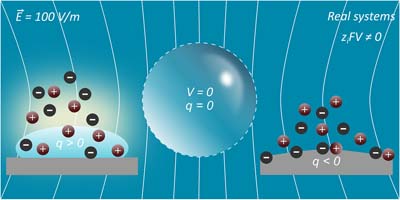
The ubiquitous non-zero electric potentials in our world profoundly impact their properties, producing unexpected chemical reactions and other surprising phenomena. So, when and where does the electroneutrality principle which "expresses the fact that all pure substances carry a net charge of zero" actually apply?
https://dx.doi.org/10.21577/0103-5053.20240079
Review J. Braz. Chem. Soc. 2024, 35(10), 1-33
Multicomponent Reactions in the Last 30 Years: How are we Today?
Henrique B. de Lima  ; Gustavo M. das Neves
; Gustavo M. das Neves  ; Itamar L. Gonçalves
; Itamar L. Gonçalves  ; Aloir A. Merlo
; Aloir A. Merlo  ; Vera L. Eifler-Lima
; Vera L. Eifler-Lima
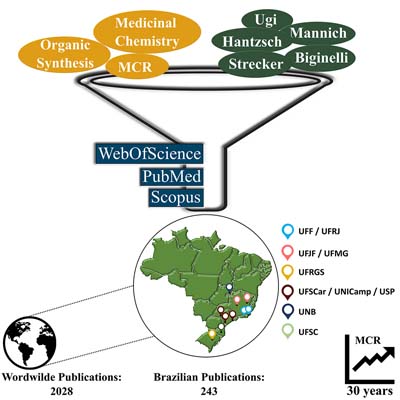
A bibliometric analysis was performed to map the research performed in Brazil on multicomponent reactions over a period of 30 years through a literature search.
https://dx.doi.org/10.21577/0103-5053.20240075
Review J. Braz. Chem. Soc. 2024, 35(10), 1-34
Revisiting Nitroaromatic Drugs: Mechanisms of Bioactivation, Metabolism and Toxicity and Methods to Synthesize Nitroaromatic Fragments
Saulo T. Abreu  ; Luis Gabriel V. Gelves
; Luis Gabriel V. Gelves  ; Eliezer J. Barreiro
; Eliezer J. Barreiro  ; Lídia M. Lima
; Lídia M. Lima
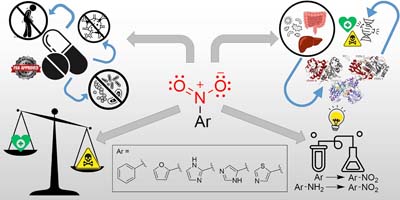
Nitroaromatic as drug: Food and Drug Administration (FDA) approval, mechanisms of bioactivation, metabolism and toxicity, and synthesis of nitroaromatic fragment by nitration and amine oxidation.
https://dx.doi.org/10.21577/0103-5053.20240071
Review J. Braz. Chem. Soc. 2024, 35(11), 1-12
A Perspective on the Supersonic Solution Blowing: Nanofibers at the Forefront of Energy Storage and Conversion, and Environmental Remediation
Vinícius D. Silva; Eliton S. Medeiros; Roberto M. Torresi
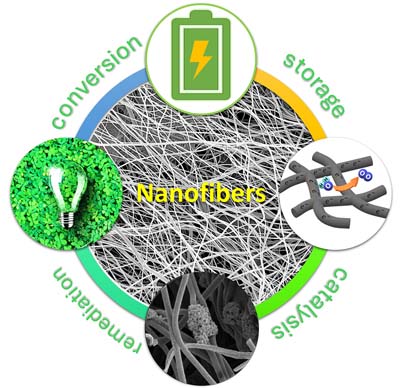
The image depicts the possible applications of the nanofibers that could involve energy storage and conversion, environmental remediation, and catalysis.
https://dx.doi.org/10.21577/0103-5053.20240065
Account J. Braz. Chem. Soc. 2024, 35(10), 1-13
LASSBio Chemical Library Diversity and FLT3 New Ligand Identification
Lucas S. Franco; Rodolfo C. Maia; Eliezer J. Barreiro 
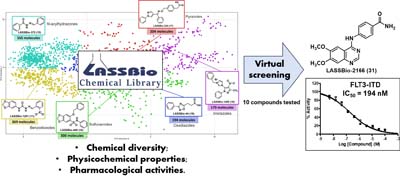
This account describes the LASSBio Chemical Library diversity and a virtual screening against feline McDonough sarcoma-like tyrosine kinase 3 (FLT3).
https://dx.doi.org/10.21577/0103-5053.20240059
Review J. Braz. Chem. Soc. 2024, 35(9), 1-14
Carbamates: Are they "Good" or "Bad Guys"?
Diego G. R. Voris  ; Samir F. A. Cavalcante
; Samir F. A. Cavalcante  ; Caio V. N. Borges
; Caio V. N. Borges  ; Antonio L. S. Lima
; Antonio L. S. Lima 
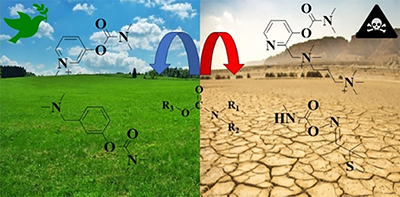
In this short review, we present how carbamates can be seen as "good guys" by their use in medicine (hope), or "bad guys", due to their misuse in pesticides and as chemical weapons (death).
https://dx.doi.org/10.21577/0103-5053.20240058
Account J. Braz. Chem. Soc. 2024, 35(10), 1-16
Flavonoids as Inspiration for the Design and Synthesis of New Antiproliferative, Antiparasitic and Antiviral Compounds: An Account
Guilherme S. Caleffi  ; Alcides J. M. da Silva
; Alcides J. M. da Silva  ; Chaquip Daher Netto
; Chaquip Daher Netto  ; Jorge L. O. Domingos
; Jorge L. O. Domingos  ; Eduardo J. Salustiano
; Eduardo J. Salustiano  ;
;
Paulo R. R. Costa 
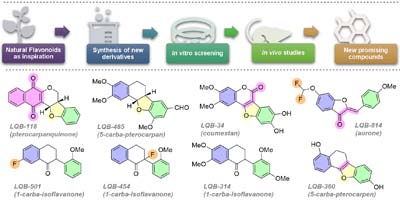
Modified flavonoids were synthesized and showed potent antiproliferative and antiparasitic activity in vitro and in vivo, and antiviral activity in vitro.
https://dx.doi.org/10.21577/0103-5053.20240056
Review J. Braz. Chem. Soc. 2024, 35(10), 1-21
Amidines: The Main Discoveries in the Synthesis and Anti-Leishmanial Effects of New Chemotherapeutic Agents
Cláudio E. Rodrigues-Santos  ; Maurício R. de Brito; Aurea Echevarria
; Maurício R. de Brito; Aurea Echevarria 
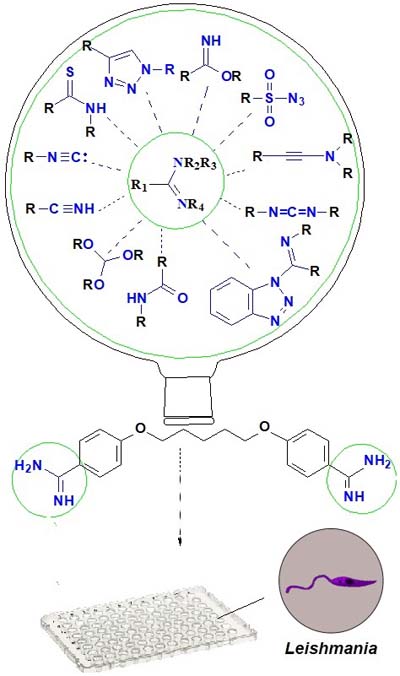
Mini review highlighting amidine derivatives: principal synthesis methods and anti-Leishmania activity results.
https://dx.doi.org/10.21577/0103-5053.20240053
Review J. Braz. Chem. Soc. 2024, 35(9), 1-19
A Systematic Review of Tropospheric Ozone Modeling Using Community Multiscale Air Quality Model (CMAQ)
Thiago F. da Costa  ; Josie B. B. Carvalho
; Josie B. B. Carvalho  ; Rizzieri Pedruzzi
; Rizzieri Pedruzzi  ; Taciana T. A. Albuquerque; Eduardo M. Martins
; Taciana T. A. Albuquerque; Eduardo M. Martins
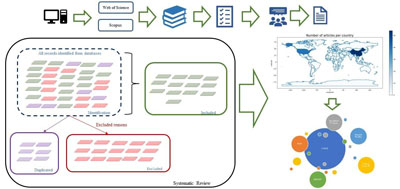
This critical review encompasses the analysis of studies from 2016 to 2023 that employ the Community Multiscale Air Quality Model (CMAQ) model for ozone simulation.
https://dx.doi.org/10.21577/0103-5053.20240042
Review J. Braz. Chem. Soc. 2024, 35(8), 1-23
Antimicrobial Potential of Soil/Sediment Mangrove Associated Fungi: A Review
Antonio Fernando V. C. Braga; Marcelino S. do Rosário; Jakson Breno N. Gomes; Cristina de A. Monteiro; Flavia A. C. Farias; Edson Rodrigues Filho; Antônio José Cantanhede Filho
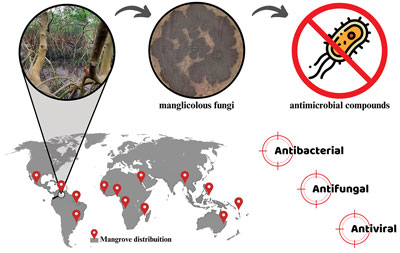
Mangroves are highly productive ecosystems distributed in tropical and subtropical regions in the world. Many different species of fungi can be isolated from this ecosystem. These fungi can be a rich source of useful antimicrobial compounds.
https://dx.doi.org/10.21577/0103-5053.20240032
Review J. Braz. Chem. Soc. 2024, 35(7), 1-41
Prenylated and Geranylated Derivatives of Non-Oxidized Monomeric Acylphloroglucinols of Natural Origin: Occurrence, Biological Properties and Spectroscopic Data
Tainá M. Arrospide; Lucas H. N. Sousa; Marcela C. N. Diniz; Fabrício G. Menezes; Renata M. Araújo
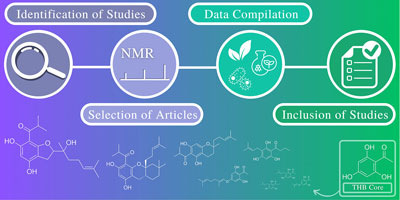
Spectroscopic, chemical and biological data published between 1965-2022 on acylphloroglucinol derivatives are compiled in this review.
https://dx.doi.org/10.21577/0103-5053.20240021
Review J. Braz. Chem. Soc. 2024, 35(3), 1-14
Occurrence of Antibiotics in Aqueous Matrices: An Outlook about the Situation in Brazil
Karla V. L. Lima; Jany H. F. de Jesus; Raquel F. P. Nogueira
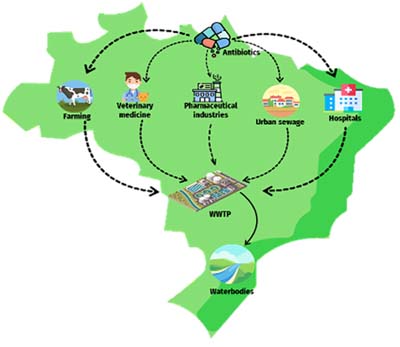
The occurrence of antibiotics in the Brazilian aqueous matrix was carefully revised. The publication of 24 articles on this occurrence revealed the detection of 23 antibiotics in 5 aquatic matrices, ranging from 0.13 to 37300 ng L−1.
https://dx.doi.org/10.21577/0103-5053.20230196
Review J. Braz. Chem. Soc. 2024, 35(1), 1-16
The World of Cave Microbiomes: Biodiversity, Ecological Interactions, Chemistry, and the Multi-Omics Integration
Natália N. Kato; Gabriel S. Arini; Ricardo Roberto Silva; Maria Elina Bichuette; José Augusto P. Bitencourt; Norberto P. Lopes
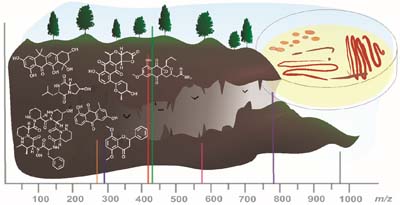
The cave ecosystem hosts a high diversity of microorganisms with complex strategies to survive in limited environmental conditions. Here, we highlight the biology and chemistry of cave microbiomes with multi-omics perspectives.
https://dx.doi.org/10.21577/0103-5053.20230148
Review J. Braz. Chem. Soc. 2024, 35(1), 1-18
Biochar and Hydrochar in the Development and Application of Electrochemical Devices in the Sensing and Degradation of Target Compounds: A Mini-Review of the Recent Contributions of 2020-2023
Jonatas O. S. Silva  ; Honnara S. Granja
; Honnara S. Granja  ; José F. dos Santos
; José F. dos Santos  ; Lisiane S. Freitas
; Lisiane S. Freitas  ; Eliana M. Sussuchi
; Eliana M. Sussuchi
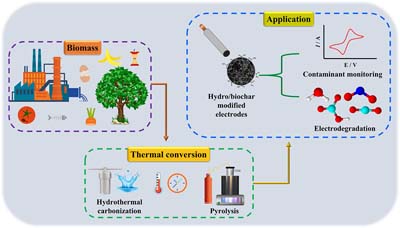
We discuss the use of biochars and hydrochars in electrodes applied in the electrochemical sensing and degradation of target compounds.
https://dx.doi.org/10.21577/0103-5053.20230143
Review J. Braz. Chem. Soc. 2024, 35(1), 1-32
Advances in Breast Cancer Drug Discovery: A Review of Therapeutic Strategies and Studies Involving Photosensitizers, Caged Xanthones and Thiosemicarbazones Derivatives
Douglas D. S. Oliveira; Thibault J. W. Jacques Dit Lapierre  ; Fernanda C. Silva; Ieda V. Cunha; Rafael A. C. Souza;
; Fernanda C. Silva; Ieda V. Cunha; Rafael A. C. Souza;
Patrícia A. Matos  ; Gustavo M. Almeida; Carolina G. Oliveira
; Gustavo M. Almeida; Carolina G. Oliveira  ; Thaise G. Araújo; Tayana M. Tsubone
; Thaise G. Araújo; Tayana M. Tsubone  ; Celso O. Rezende Jr.
; Celso O. Rezende Jr.
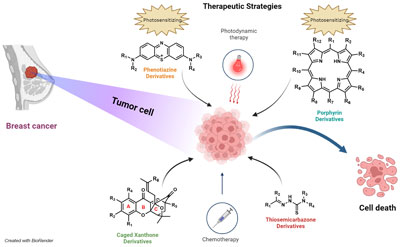
This review presents the principal aspects of the drug discovery process targeting breast cancer and highlights the most promising derivatives of caged xanthones and thiosemicarbazones explored in conventional therapy. Also, it presents details of photodynamic therapy and the action of photosensitizers as an alternative therapy for breast cancer.
https://dx.doi.org/10.21577/0103-5053.20230128
Account J. Braz. Chem. Soc. 2024, 35(1), 1-18
The Art of Scientific Writing and Ethical Use of Artificial Intelligence
Brenno Amaro D. Neto  ; Marcos N. Eberlin
; Marcos N. Eberlin

Scientific writing from first words to publication, as well as its challenges, including ethical aspects, are presented and discussed in this opinion manuscript.
https://dx.doi.org/10.21577/0103-5053.20230121
Review J. Braz. Chem. Soc. 2023, 34(11), 1565-1580
The Versatility of Two-Dimensional Liquid Chromatography
Carmen L. Cardoso  ; Marcela C. de Moraes
; Marcela C. de Moraes  ; Quezia B. Cass
; Quezia B. Cass
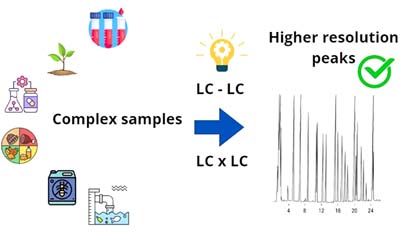
Two-dimensional liquid chromatography (2D-LC) for multiple applications.
https://dx.doi.org/10.21577/0103-5053.20230118
Review J. Braz. Chem. Soc. 2023, 34(11), 1542-1564
Capillary Electromigration Techniques Applied to Clinical Chemistry Investigations and Alternative Diagnostic Assays: Possibilities and Perspectives
Olívia B. O. Moreira  ; Bruna M. Berlande; Jéssica C. Q. de Souza
; Bruna M. Berlande; Jéssica C. Q. de Souza  ; João Marcos B. Candido
; João Marcos B. Candido  ; Lauren H. Jaeger
; Lauren H. Jaeger  ;
;
Luiz Henrique C. Adriano; Marco Antônio D. A. e Brito; Maria Patrícia do Nascimento  ; Patrícia A. Geraldo; Paula R. Chellini
; Patrícia A. Geraldo; Paula R. Chellini  ;
;
Marcone Augusto L. de Oliveira
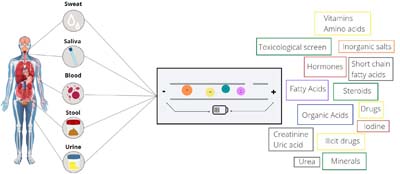
Medicine has been improving the assessment of health-related biomarkers towards precise diagnosis. In this context, we discuss how capillary electromigration techniques stand out as an alternative for the development of new high-efficient cost-effective diagnostic assays.
https://dx.doi.org/10.21577/0103-5053.20230096
Review J. Braz. Chem. Soc. 2023, 34(8), 1041-1070
Recent Synthetic Developments of Asymmetric Multicomponent Transformations: Strecker, Mannich, Passerini and Ugi Reactions
Marcelo H. R. Carvalho; Giovanni W. Amarante  ; Pedro P. de Castro
; Pedro P. de Castro
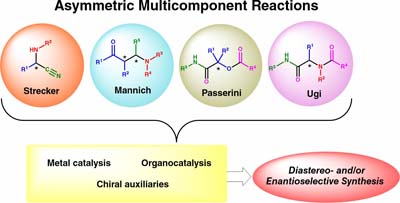
A general overview on synthetic developments on stereoselective methodologies for Strecker, Mannich, Passerini and Ugi reactions are hereby presented.
https://dx.doi.org/10.21577/0103-5053.20230082
Review J. Braz. Chem. Soc. 2023, 34(7), 897-905
Biogenic Silver Nanoparticles Capped with Proteins: Timed Knowledge and Perspectives
Nelson Durán  ; Wagner J. Fávaro
; Wagner J. Fávaro  ; Silvana Alborés
; Silvana Alborés  ; Thyerre S. da Costa
; Thyerre S. da Costa  ; Ljubica Tasic
; Ljubica Tasic
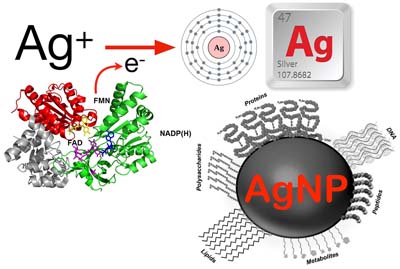
Biogenic silver nanoparticles are synthesized through silver(I) reduction promoted by biomolecules. The one-pot biosynthetic process leads to stable silver nanoparticle (AgNP) colloids with surfaces capped by some of the biomolecules that also took part in their synthesis.
https://dx.doi.org/10.21577/0103-5053.20230062
Review J. Braz. Chem. Soc. 2023, 34(6), 755-777
Computation-Guided Support to Experiments by the Exploration of Reaction Mechanisms: Organic Synthesis, Natural Products and Environmental Issues
Karine N. de Andrade  ; José Renato D. Fajardo
; José Renato D. Fajardo  ; Caio A. Leal
; Caio A. Leal  ; José Walkimar M. Carneiro
; José Walkimar M. Carneiro  ; Rodolfo G. Fiorot
; Rodolfo G. Fiorot
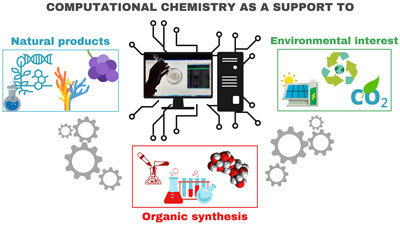
Computational chemistry is a valuable tool for understanding reaction mechanisms and supporting experiments in several areas, such as organic synthesis, natural products (and biochemical transformations), and systems of environmental interest.
https://dx.doi.org/10.21577/0103-5053.20230043
Review J. Braz. Chem. Soc. 2023, 34(5), 615-640
Combining Fluorescent Quantum Dots with Molecularly Imprinted Polymers for the Screening of both Emerging and Classical Environmental Pollutants: A Review
Shakeel Zeb; Javier E. L. Villa; Ademar Wong; Sabir Khan  ; Sajjad Hussain; Maria D. P. T. Sotomayor
; Sajjad Hussain; Maria D. P. T. Sotomayor
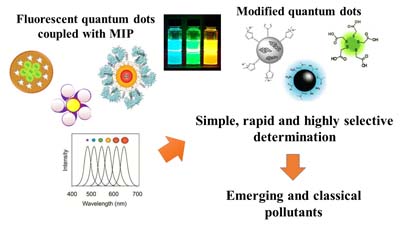
Graphically representation of quantum dots (QDs) coated molecular imprinted polymer sensor for the determination of emerging and classical pollutants. Nanoscale QD materials are suitable for fluorescence analysis. The modification with quantum dots provides many advantages such as rapid detection, highly selective and easily operational.
https://dx.doi.org/10.21577/0103-5053.20230015
Review J. Braz. Chem. Soc. 2023, 34(4), 485-501
Marine Natural Products in the Battle against Dengue, Zika, and Chikungunya Arboviruses
Thayssa S. F. Fagundes  ; Thatyana R. A. Vasconcelos
; Thatyana R. A. Vasconcelos  ; Fernando M. dos Santos Junior
; Fernando M. dos Santos Junior  ; Bia F. Rajsfus
; Bia F. Rajsfus  ; Diego Allonso
; Diego Allonso  ; José C. J. M. D. S. Menezes
; José C. J. M. D. S. Menezes  ; Alessandra L. Valverde
; Alessandra L. Valverde  ; Vinicius R. Campos
; Vinicius R. Campos
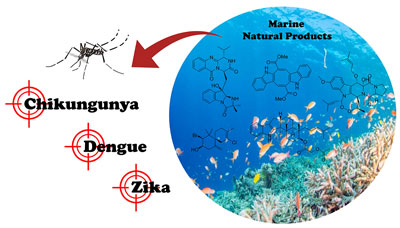
The review highlights the different studies on marine natural products with antiviral and larvicidal activity against Dengue, Zika and Chikungunya and their main vector Aedes aegypti.
https://dx.doi.org/10.21577/0103-5053.20230012
Review J. Braz. Chem. Soc. 2023, 34(4), 471-484
Strategies for Metabolomic Analysis of Damaged Skin from Cell and Tissue Samples Using Gas Chromatography-Mass Spectrometry
Samantha C. H. Rodrigues; Helvécio C. Menezes; Dawidson A. Gomes; Zenilda L. Cardeal
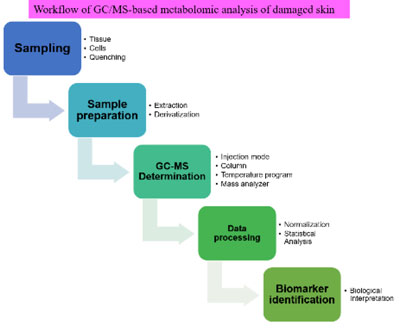
Workflow of gas chromatography coupled to mass spectrometry-based metabolomics analysis of damage skin.
https://dx.doi.org/10.21577/0103-5053.20230005
Review J. Braz. Chem. Soc. 2023, 34(2), 153-166
Fusel Oil: Chemical Composition and an Overview of Its Potential Application
Thainara B. Massa  ; Djéssica T. Raspe
; Djéssica T. Raspe  ; Mirian C. Feiten
; Mirian C. Feiten  ; Lúcio Cardozo-Filho
; Lúcio Cardozo-Filho  ; Camila da Silva
; Camila da Silva
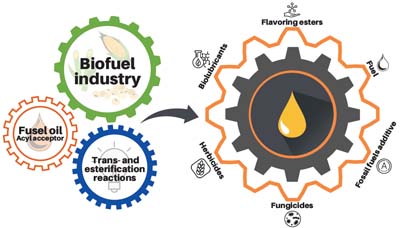
The production, chemical composition and potential applications of fusel oil were demonstrated.
https://dx.doi.org/10.21577/0103-5053.20220145
Review J. Braz. Chem. Soc. 2022, 33(12), 1353-1374
Reaching Circular Economy through Circular Chemistry: The Basis for Sustainable Development
Lilian L. N. Guarieiro; Michelle J. C. Rezende; Willams T. Barbosa; Gisele O. da Rocha; Pedro Afonso P. Pereira; Daniella R. Fernandes; Wilson A. Lopes; Claudio J. A. Mota  ; Jailson B. de Andrade
; Jailson B. de Andrade
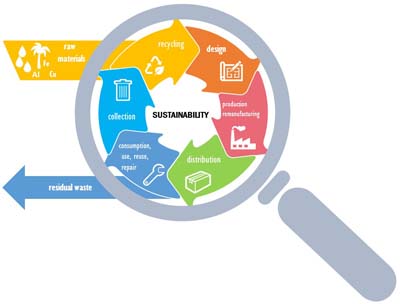
The circular economy and circular chemistry play an important role in the challenges and issues related to sustainability.
https://dx.doi.org/10.21577/0103-5053.20220119
Review J. Braz. Chem. Soc. 2022, 33(8), 870-893
Biosurfactants: Sustainable and Versatile Molecules
Fernanda G. Barbosa; Daylin R. Ribeaux; Thiago Rocha  ; Rogger A. M. Costa; Ramiro R. Guzmán; Paulo R. F. Marcelino
; Rogger A. M. Costa; Ramiro R. Guzmán; Paulo R. F. Marcelino  ; Talita M. Lacerda; Silvio S. da Silva
; Talita M. Lacerda; Silvio S. da Silva
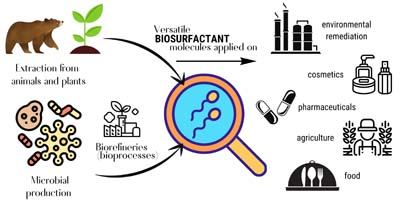
Biosurfactants are molecules of animal, vegetable and microbial origin with various industrial applications. Animal and plant biosurfactants are obtained by extractive methods. Microbial biosurfactants are extracelular metabolites and can be obtained by fermentation processes in the biorefineries contexts.
https://dx.doi.org/10.21577/0103-5053.20220074
Review J. Braz. Chem. Soc. 2022, 33(8), 844-869
Technological Perspectives and Economic Aspects of Green Hydrogen in the Energetic Transition: Challenges for Chemistry
Lilian L. N. Guarieiro; Jeancarlo P. dos Anjos; Luciana A. da Silva  ; Alex Á. B. Santos; Ewerton E. S. Calixto; Fernando L. P. Pessoa; Jose L. G. de Almeida; Miguel Andrade Filho; Flavio S. Marinho
; Alex Á. B. Santos; Ewerton E. S. Calixto; Fernando L. P. Pessoa; Jose L. G. de Almeida; Miguel Andrade Filho; Flavio S. Marinho  ; Gisele O. da Rocha; Jailson B. de Andrade
; Gisele O. da Rocha; Jailson B. de Andrade
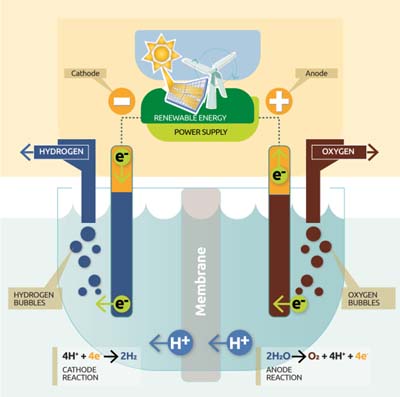
Green is the color of the future.
https://dx.doi.org/10.21577/0103-5053.20220052
Review J. Braz. Chem. Soc. 2022, 33(7), 681-692
Internet of Things as a Tool for Sustainable Analytical Chemistry: A Review
Alegre N. S. Cadeado; Caio C. S. Machado; Geandre C. Oliveira  ; Daniela A. S e Silva; Rodrigo A. A. Muñoz
; Daniela A. S e Silva; Rodrigo A. A. Muñoz  ; Sidnei G. Silva
; Sidnei G. Silva

Internet of things (IoT) can play key role to attend the sustainable development goals. The association of IoT with analytical chemistry enables the real-time analytes monitoring, that assess impacts of human activities on environmental and human health.
https://dx.doi.org/10.21577/0103-5053.20220048
Review J. Braz. Chem. Soc. 2022, 33(6), 509-522
NMR Relaxometry Applied to Chemical Studies of Paramagnetic Metal Cation Complexes: Fundamentals and Applications
Flávio V. C. Kock  ; Luiz A. Colnago
; Luiz A. Colnago
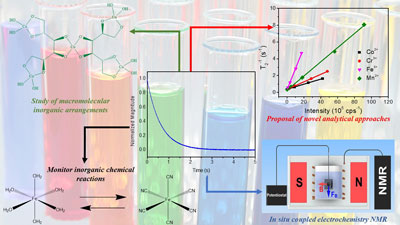
This review provides basic theory of time domain nuclear magnetic resonance (TD-NMR) relaxometry of paramagnetic cations in solution and important applications in electrochemistry, analytical and inorganic chemistry.
https://dx.doi.org/10.21577/0103-5053.20220045
Review J. Braz. Chem. Soc. 2022, 33(7), 664-680
Sustainable Synthetic Strategies for the Preparation of Low Molecular Weight Drugs by Biotech Routes
Patricia G. Ferreira  ; Alcione S. de Carvalho
; Alcione S. de Carvalho  ; Wilson C. Santos
; Wilson C. Santos  ; Luana S. M. Forezi
; Luana S. M. Forezi  ; Fernando C. da Silva
; Fernando C. da Silva  ;
;
Vitor F. Ferreira

This review intends to show how the challenges for the production of some low molecular weight drugs produced by synthetic routes that involve at least one biotechnological step using microorganisms or enzymes were faced.
https://dx.doi.org/10.21577/0103-5053.20220044
Review J. Braz. Chem. Soc. 2022, 33(8), 824-843
Is Hydrogen Indispensable for a Sustainable World? A Review of H2 Applications and Perspectives for the Next Year
Theodora W. Von Zuben; Daniel E. B. Moreira; Rafael L. Germscheidt; Rafael G. Yoshimura  ; Daniel S. Dorretto; Ana B. S. de Araujo; Airton G. Salles Jr.
; Daniel S. Dorretto; Ana B. S. de Araujo; Airton G. Salles Jr.  ; Juliano A. Bonacin
; Juliano A. Bonacin
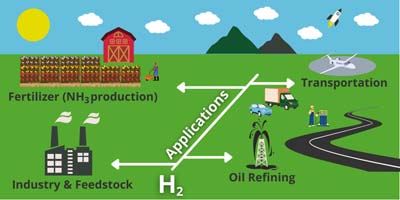
In this review, we present an overview of the uses of hydrogen and its importance to a sustainable society.
https://dx.doi.org/10.21577/0103-5053.20220026
Review J. Braz. Chem. Soc. 2022, 33(7), 637-663
Recent Developments on Palladium-Catalyzed Carbonylation Reactions in Renewable Solvents
Danilo Y. de Albuquerque; Wystan K. O. Teixeira; Senthil Narayanaperumal; Ricardo S. Schwab
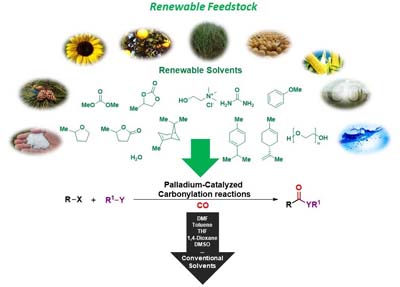
The solvents derived from renewable raw materials can be used as an alternative green media for palladium-catalyzed carbonylation reactions, offering a promising and alternative way to construct a wide array of organic molecules carrying a carbon-oxygen double bond.
https://dx.doi.org/10.21577/0103-5053.20220024
Review J. Braz. Chem. Soc. 2022, 33(7), 610-636
Sustainable and Reusable Sulfonic Acid-Functionalized Task-Specific Ionic Liquid Catalysts for Multicomponent Reactions. A Review
Nicolas S. dos Anjos  ; Luiz S. Longo Jr.
; Luiz S. Longo Jr.
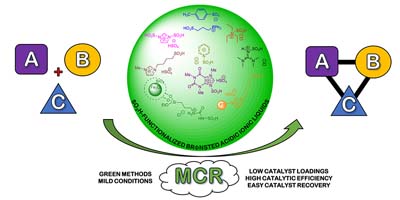
In this review contribution we discuss the use of sulfonic acid-functionalized task-specific ionic liquids as sustainable and reusable catalysts for multicomponent reactions applied to the synthesis of heterocycles and related compounds.
https://dx.doi.org/10.21577/0103-5053.20220021
Review J. Braz. Chem. Soc. 2022, 33(4), 303-326
Microplastics in Latin America Ecosystems: A Critical Review of the Current Stage and Research Needs
Andreia N. Fernandes  ; Crislaine Bertoldi; Larissa Z. Lara; Jéssica Stival; Nortom M. Alves; Pedro M. Cabrera; Marco T. Grassi
; Crislaine Bertoldi; Larissa Z. Lara; Jéssica Stival; Nortom M. Alves; Pedro M. Cabrera; Marco T. Grassi
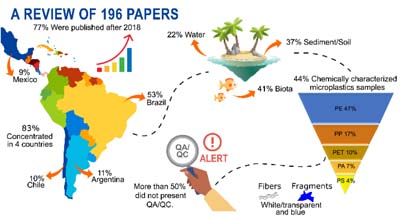
A systematic review analyzing 196 studies from 16 territorials in Latin America with information about the current state of knowledge regarding the abundance, distribution, and associated impact of microplastics in different matrices was performed.
https://dx.doi.org/10.21577/0103-5053.20220018
Review J. Braz. Chem. Soc. 2022, 33(8), 815-823
Amino Acid-Based Deep Eutectic Solvents in Biomass Processing - Recent Advances
Gustavo R. Gomes  ; Renan R. Mattioli
; Renan R. Mattioli  ; Julio Cezar Pastre
; Julio Cezar Pastre
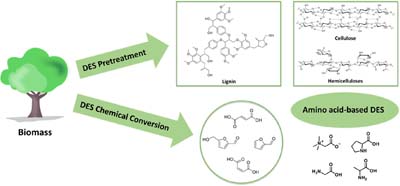
Amino acid-based deep eutectic solvents (DES) as a greener methodology for biomass fractionation and sugars chemical conversion to high value-added compounds.
https://dx.doi.org/10.21577/0103-5053.20210150
Review J. Braz. Chem. Soc. 2022, 33(2), 111-127
Seleno- and Telluro-Functionalization of Quinones: Molecules with Relevant Biological Application
Pâmella S. Cordeiro  ; Ingrid C. Chipoline
; Ingrid C. Chipoline  ; Ruan C. B. Ribeiro
; Ruan C. B. Ribeiro  ; David R. Pinho; Vitor F. Ferreira
; David R. Pinho; Vitor F. Ferreira  ; Fernando C. da Silva
; Fernando C. da Silva  ; Luana S. M. Forezi
; Luana S. M. Forezi  ; Vanessa Nascimento
; Vanessa Nascimento
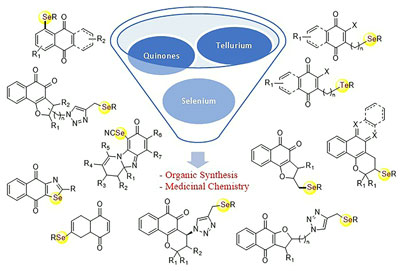
In this review, the methods for the production of selenium-quinones and tellurium-quinones and their biological applications until 2021 are highlighted.
https://dx.doi.org/10.21577/0103-5053.20210148
Review J. Braz. Chem. Soc. 2021, 32(10), 1895-1911
Iron Ore Tailings: Characterization and Applications
Ottávio R. Carmignano; Sara S. Vieira  ; Ana Paula C. Teixeira; Fernando S. Lameiras; Paulo Roberto G. Brandão; Rochel M. Lago
; Ana Paula C. Teixeira; Fernando S. Lameiras; Paulo Roberto G. Brandão; Rochel M. Lago
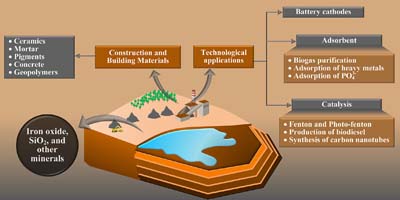
Iron ore tailings (IOT) are mainly composed of iron oxides, silica, and other minerals such as kaolinite. The IOT can be used for different applications related to the civil construction and a variety of technological applications.
https://dx.doi.org/10.21577/0103-5053.20210100
Review J. Braz. Chem. Soc. 2021, 32(9), 1711-1738
Interfacial Electron Transfer in Dye-Sensitized TiO2 Devices for Solar Energy Conversion
Andressa V. Müller  ; Wendel M. Wierzba; Mariana N. Pastorelli; André S. Polo
; Wendel M. Wierzba; Mariana N. Pastorelli; André S. Polo
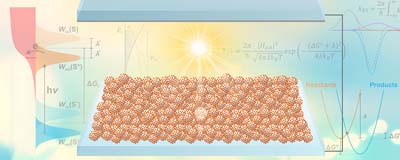
The interfacial electron transfer reactions that take place in dye-sensitized TiO2 molecular devices for solar energy conversion govern their efficiency. This review visits general aspects of these reactions.
https://dx.doi.org/10.21577/0103-5053.20210083
Review J. Braz. Chem. Soc. 2021, 32(9), 1687-1710
Nanobiosensors for Pathogenic Agents Detection
Mayra Beltrán-Pineda; Diana Peña-Solórzano  ; César Augusto Sierra
; César Augusto Sierra
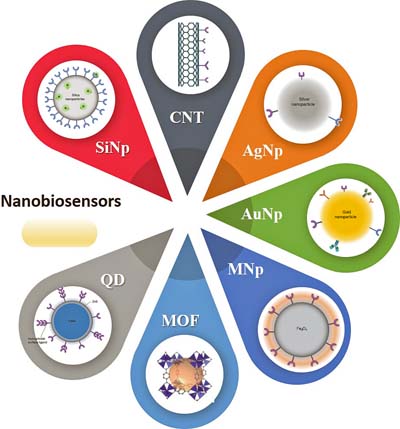
This review provides an overview and update regarding the use of some nanomaterials as biosensors, which have shown attractive results over the last few years.
https://dx.doi.org/10.21577/0103-5053.20210081
Review J. Braz. Chem. Soc. 2021, 32(8), 1499-1518
Absolute Configuration Reassignment of Natural Products: An Overview of the Last Decade
Andrea N. L. Batista  ; Bianca R. P. Angrisani; Maria Emanuelle D. Lima; Stephanie M. P. da Silva; Vitória H. Schettini
; Bianca R. P. Angrisani; Maria Emanuelle D. Lima; Stephanie M. P. da Silva; Vitória H. Schettini  ; Higor A. Chagas; Fernando M. dos Santos Jr.; João M. Batista Jr.
; Higor A. Chagas; Fernando M. dos Santos Jr.; João M. Batista Jr.  ; Alessandra L. Valverde
; Alessandra L. Valverde
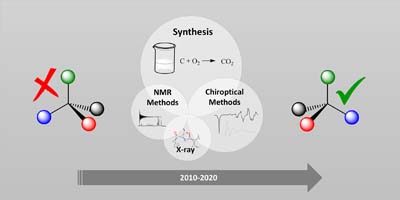
This review highlights the increase in the number of absolute configuration reassignments of natural products over the last decade and describes the main approaches used both in the original incorrect assignments and stereochemical corrections. It also provides the readers with critical information for the choice of appropriate methods for unambiguous stereochemical determination.
https://dx.doi.org/10.21577/0103-5053.20210079
Review J. Braz. Chem. Soc. 2021, 32(7), 1301-1344
Biodiesel: An Overview II
Michelle J. C. Rezende  ; Ana Lúcia de Lima; Bárbara V. Silva; Claudio J. A. Mota; Ednildo A. Torres; Gisele O. da Rocha; Ingrid M. M. Cardozo; Kênia P. Costa; Lilian L. N. Guarieiro; Pedro A. P. Pereira
; Ana Lúcia de Lima; Bárbara V. Silva; Claudio J. A. Mota; Ednildo A. Torres; Gisele O. da Rocha; Ingrid M. M. Cardozo; Kênia P. Costa; Lilian L. N. Guarieiro; Pedro A. P. Pereira  ; Sabrina Martinez; Jailson B. de Andrade
; Sabrina Martinez; Jailson B. de Andrade
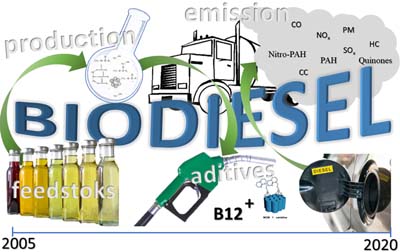
Worldwide use and advances in biodiesel research over the past 15 years are reported in this review.
https://dx.doi.org/10.21577/0103-5053.20210046
Review J. Braz. Chem. Soc. 2021, 32(5), 917-952
A Catalysis Guide Focusing on C-H Activation Processes
Renato L. Carvalho; Gleiston G. Dias; Cynthia L. M. Pereira; Pintu Ghosh; Debabrata Maiti  ; Eufrânio N. da Silva Júnior
; Eufrânio N. da Silva Júnior
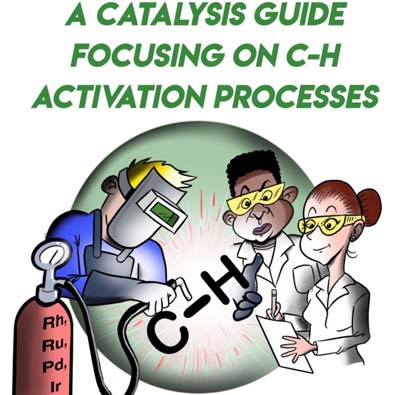
A C-H activation process represents one of the most advanced tool in the field of organic synthesis nowadays, and it requires knowledge that should be studied and learned. Therefore, carrying out a C-H activation reaction in the right direction, following the right steps, can improve its performance and guarantee plausible results.
https://dx.doi.org/10.21577/0103-5053.20210025
Review J. Braz. Chem. Soc. 2020, 31(12), 2439-2451
Calibration Strategies Applied to Laser-Induced Breakdown Spectroscopy: A Critical Review of Advances and Challenges
Vinicius C. Costa; Diego V. Babos; Jeyne P. Castro; Daniel F. Andrade; Raimundo R. Gamela; Raquel C. Machado  ; Marco A. Sperança; Alisson S. Araújo; José A. Garcia; Edenir R. Pereira-Filho
; Marco A. Sperança; Alisson S. Araújo; José A. Garcia; Edenir R. Pereira-Filho
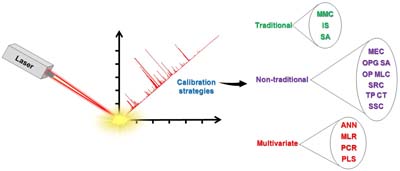
Several calibration strategies have been reported in the literature over the last few years to improve quantitative analysis using laser-induced breakdown spectroscopy (LIBS).
https://dx.doi.org/10.21577/0103-5053.20200175
Review J. Braz. Chem. Soc. 2020, 31(11), 2176-2199
Supramolecular Approach in Energy Conversion Devices
Ronaldo C. Amaral  ; Kassio P. S. Zanoni
; Kassio P. S. Zanoni  ; Lais S. Matos
; Lais S. Matos  ; Neyde Y. Murakami Iha
; Neyde Y. Murakami Iha
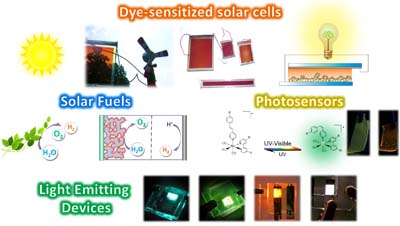
This review manly focusses on development of energy conversion devices, such as dye-sensitized solar cells, solar fuels, photosensors and light-emitting devices by outlining investigations carried out at the Laboratory of Photochemistry and Energy Conversion (LFCE) in the University of São Paulo, including researches that led to technological innovation.
https://dx.doi.org/10.21577/0103-5053.20200095
Review J. Braz. Chem. Soc. 2020, 31(2), 230-243
Recent Developments on the Elucidation of Colloidal Aspects of Asphaltenes and Their Relevance to Oilfield Problems
Lia B. S. Balestrin  ; Watson Loh
; Watson Loh
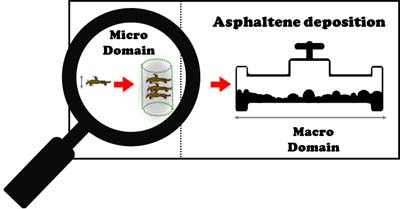
This review discusses colloidal aspects of crude oil asphaltenes and their impact on oil production issues.
https://dx.doi.org/10.21577/0103-5053.20190257
Review J. Braz. Chem. Soc. 2020, 31(2), 211-229
An Overview of the Photocatalytic H2 Evolution by Semiconductor-Based Materials for Nonspecialists
Ivo F. Teixeira  ; Jhon Quiroz; Mauricio S. Homsi; Pedro H. C. Camargo
; Jhon Quiroz; Mauricio S. Homsi; Pedro H. C. Camargo
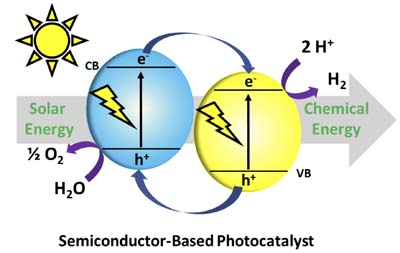
We review semiconductor photocatalysts for the H2 evolution reaction that have displayed the best reported activities and quantum efficiencies.
https://dx.doi.org/10.21577/0103-5053.20190255
Review J. Braz. Chem. Soc. 2020, 31(1), 2-14
Serpentinites: Mineral Structure, Properties and Technological Applications
Ottavio Raul D. R. Carmignano; Sara S. Vieira; Paulo Roberto G. Brandao; Alexandre C. Bertoli; Rochel M. Lago
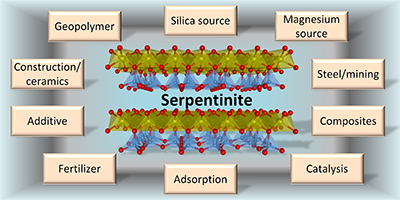
The serpentine is a versatile mineral family rich in Mg silicate with several polymorphic phases with unique physicochemical properties and potential applications.
https://dx.doi.org/10.21577/0103-5053.20190215
Online version ISSN 1678-4790 Printed version ISSN 0103-5053
Journal of the Brazilian Chemical Society
JBCS Editorial and Publishing Office
University of Campinas - UNICAMP
13083-970 Campinas-SP, Brazil
Free access









